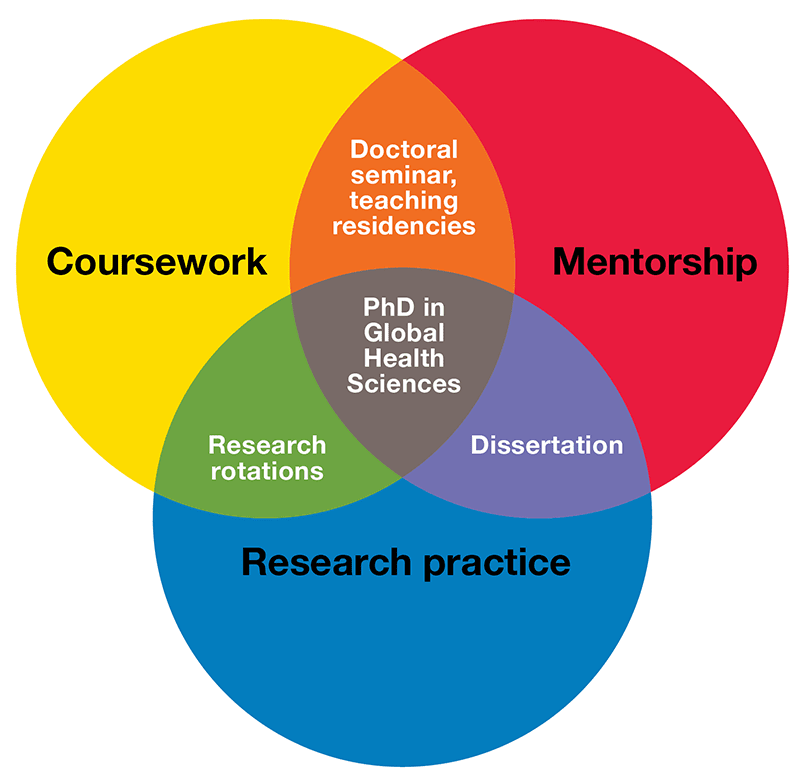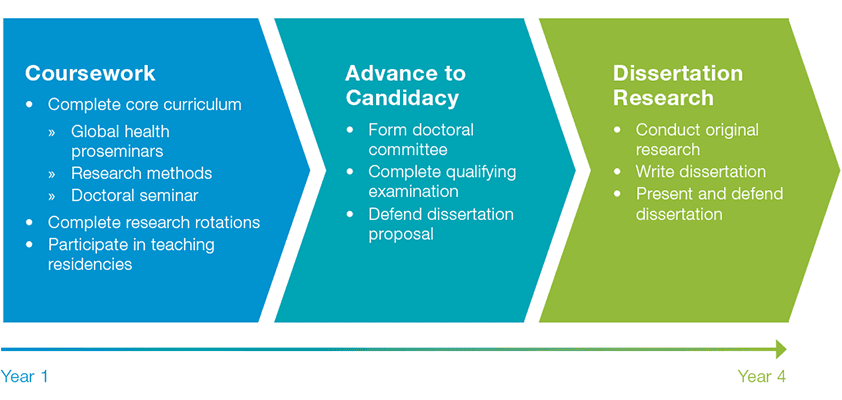The Doctor of Philosophy (PhD) degree program in Global Health Sciences provides all students with a deep knowledge of important global health issues, as well as a high level of skill in health research methodology and practice.
This interdisciplinary program trains doctoral students on methods and modes of inquiry drawn from public health, public policy, economics, development studies, implementation science and the social sciences to explore and address global health problems. Students graduate with comprehensive skills, training and experience in global health research and practice.

Program Progression
The PhD program is structured as a four-year degree. Students typically spend the first two years in residence at the UCSF Mission Bay campus, completing coursework and engaging in research rotations and teaching residencies with the faculty at UCSF. After completing the core curriculum and passing the qualifying examination, students spend the next two years focused on conducting their independent dissertation research and engaging in other research and professional activities under the guidance of research advisors and faculty mentors.
In response to the COVID-19 pandemic, we have restructured in-person courses at UCSF to be suitable for remote learning. We will continue to innovate and learn from this experience and convert more courses to synchronized and asynchronized online modules.

Mentorship
All doctoral students work closely with teaching faculty, academic and research advisors, and program leaders to receive one-on-one mentoring as they progress through coursework, qualifying exams, and dissertation research and writing.
Academic Advisor
At the start of the program, all students are matched with an academic advisor from the PhD Core Faculty group. Academic advisors help guide students to clarify their research interests, prioritize courses and training areas to match their goals, and identify important professional development strategies. Academic advisors provide critical oversight of academic progress while the student is completing coursework.
Research Advisor
As students identify their areas of research interest, they will choose a faculty member to serve as their research advisor and oversee their doctoral research. Research advisors help students navigate the process of completing dissertation research, from forming relevant questions to conducting research and writing up the results. Research advisors also mentor students as they plan for the next phase of their career.
Doctoral Committee
During their first two years in the program, students will form their doctoral committee consisting of their academic and research advisors, as well as at least two other UCSF faculty members who are either content or methods experts in the students’ interest areas. Each member of a student’s doctoral committee plays a specific role in helping the student develop and conduct their doctoral research. Members of the doctoral committee mentor the student as they develop a proposal for their dissertation research and conduct the research, culminating in their doctoral dissertation.
Research Rotations
During the two years of coursework, students complete two research rotations with mentors of their choice. Research rotations provide an opportunity for experiential learning: students apply the concepts they have studied in the classroom to real-world situations, where they learn practical aspects of conducting global health research and are exposed to new areas of research and methodologies. In addition to expanding students’ education, research rotations are excellent opportunities for students to get to know faculty who may serve as future mentors or members of their doctoral committee. Students also may arrange for research rotations in global health settings outside of UCSF, for example, with the World Health Organization, Centers for Disease Control and Prevention, or other public or private organizations.
Teaching Residencies
Doctoral students are required to complete two teaching residencies during their time in the program. Teaching residencies help further develop students’ skills in specific areas under the tutelage of experienced faculty, which in turn prepares them for future educational roles, including as faculty.
Research Homes
PhD students are based at the Institute for Global Health Sciences (IGHS), although their global health research advisors can be found across the UCSF campus, often as part of larger research groups dedicated to tackling health topics and disease areas of global importance. When choosing a research area and advisors, students are encouraged to embed themselves in a research group or team, which their research advisor usually facilitates. Research homes include, but are not limited to, those listed below.
Institute for Global Health Sciences
- Center for Global Health Diplomacy, Delivery and Economics
- Center for Health Equity in Surgery and Anesthesia (CHESA)
- Center for Malaria and Vector-Borne Disease
- Malaria Elimination Initiative
- Center for Pandemic Preparedness and Response
- UCSF Pandemic Initiative for Equity and Action
- Center for Global Maternal, Newborn and Child Health
- Global Action in Nursing (GAIN)
- Center for Global Strategic Information and Public Health Practice
- Global Strategic Information
- California Department of Public Health contracts
- Preventive Medicine
